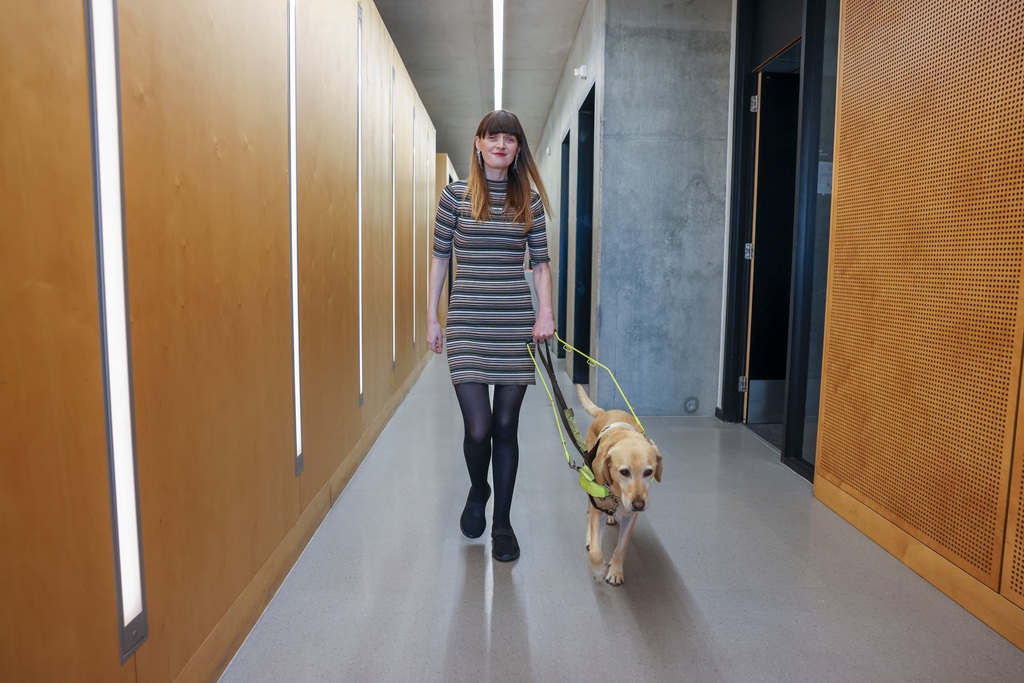How to make life easier for colleagues with sight/hearing loss in lockdown

The COVID pandemic has changed lives across the globe, with many people now working and studying from home. Deaf advocate and Deafblind UK blogger Louise Goldsmith finds out more about the impact of this on people with sensory loss, and how we can all help make life easier for them.
“Although working and studying from home suits many of us, it can create new difficulties for people living with sight and/or hearing loss. I’ve investigated some of the challenges we now face and suggested some tips to overcome this. I hope with this knowledge, and understanding, future institutions and employment settings can tackle these barriers head on and create a more inclusive environment for everyone.
Video calls are now becoming increasingly popular on a business and pleasure basis. Workplaces and universities are becoming remote settings, due to lockdown restrictions. To help make a difference, when preparing for a video call, it is important that you ensure you are sat in a room with good lighting, to ensure that your colleagues/peers can see your face and are able to lipread if needed. Sitting in front of windows and areas with a bright lighting, can result in your face becoming dark on the screen, so try to avoid this.
The environment also needs to be quiet, to ensure that there is no background noise that can also be picked up on the microphone. This would make communication difficult for those with a hearing loss who would struggle to hear you. Large video calls can be particularly difficult for people who are deafblind. It can be hard to keep track of the conversation and identify the speaker. Deafblind UK recommends a maximum of 10 people are involved in a video call.
As a severe to profound deaf person myself, who currently works from home, I have had to quickly adjust to working online. All staff meetings and one-to-one meetings are now carried out on Microsoft Teams. At first I was apprehensive, because I was unsure whether these programmes would be accessible for me. However, I soon discovered there was a live captions feature, which has helped me hugely!
I often get lost during meetings, and I’m unsure of who is speaking, so I prefer my colleagues to turn on their cameras and say their name before they speak so I can identify the speaker and lipread them if needed. I have communication support (two Lipspeakers) which helps bridge the communication gap, although, it is still easy to get lost during a meeting. I ‘pin’ my two Lipspeakers, which enlarges them both on the screen, so I can clearly see their signing and read their lips. If we have one speaker in the meeting, I like to ‘pin’ them too, so I can see them clearly.
I suffer from ‘Concentration Fatigue’, caused by reading the captions, watching my Lipspeaker and sometimes watching the speaker. This means that I am putting more energy into concentrating on the meeting. It can be really exhausting, so regular breaks are ideal for me, and allow me to ‘recharge’. We often have a 5-minute break, every 30 minutes. If a meeting is not accessible for me, I often like to feedback during the end of the meeting, to ensure that correct measures are taken in future meetings, to make this accessible for me.
I spoke to @ABlurredMuffle, who is a deafblind disability blogger. She is currently working from home for a small business in Customer Service and Social Media Management. Dealing with customers can be difficult because they often send ‘voice notes’, rather than texting, which can be incredibly frustrating and stressful for her. She relies on WhatsApp text and emailing for communication, as she is unable to meet in person, due to masks, which create a communication barrier for her. Videocalls and phone calls are a massive struggle, so she decided to avoid these.
When the management is absent, she is temporary placed in charge, which has become an issue, because the company loses out on customers who wish to call via the telephone, or videocall. Part of the job role, involves communication with other companies, some of the companies like to share podcasts about a product launch, or something relevant to the company. Sadly, they are inaccessible for ‘A Blurred Muffle’, as they are never captioned. When requesting subtitles, the usual response is that they are “too much hassle”. The absence of the provision of transcriptions after a live event is also a big issue. These live events would benefit her on a career basis, in terms of growth, but due to the lack of accessibility, she avoids these events.
I also spoke to Faith Wilkinson, a Deaf Cochlear Implant recipient. Faith is currently working from home as an administrator for a law firm. She discussed some of the difficulties when working remotely from home, in particular the struggle with video calls over Zoom. Meetings via Zoom with a large group of her colleagues can be difficult, especially trying to keep track, and hear the topic of the conversation. The transition from carrying out training in person, to completing the training over Zoom has been more challenging for Faith because she does not have the benefit of hands-on training, or lipreading. Despite being aware of the ‘Closed Captions’ feature, this is not helpful, due to them frequently appearing inaccurately.
Another barrier she faces at work is her inability to use the work phone. Her colleagues can relay information quicker, in comparison to Faith, who alternatively relies on emailing and the Microsoft Teams platform, which is not convenient for her. Faith’s work colleagues are aware of her struggles and found different ways to overcome some of the barriers. With regards to the Zoom staff meetings, staff need to speak one at a time during the meeting, so Faith can keep up with the conversation and make sense of what is being said in the meeting. Faith has also discovered her employment setting has an intranet, where she can refer to her training. The information provided is all visual, and easily accessible for her, which she describes as “very helpful”. She also mentions having a training ‘buddy’ which has proven to be beneficial because it has allowed her to get used to training, and it is easy to contact them when she needs them. She finds that she adapts easily and gets used to her buddy’s speech quicker which is really positive.
It is clear that there needs to be more consideration for people with a single/dual sensory loss who are working from home to ensure that they have equal access to vital staff communications. Video calls are usually perceived as accessible, particularly for those who are deaf or Hard of Hearing. However, this is not always the case. Captions can play a vital role in accessibility, but these must be accurately displayed, to avoid miscommunication.
Colleagues also need to be understanding that tasks can sometimes take longer to complete. For example, hearing colleagues may be able to get through workload quicker, by making phone calls. On the other hand, Faith, would not be able to use the phone, so would communicate via other methods. This can be time consuming if perhaps, she had to wait for an email response, instead of being able to instantly chat with someone.
Raising awareness of these struggles and doing what we can to help our colleagues is vital to make more people aware of accessibility in the future.”
Let’s keep in touch!
Join our mailing list and we will keep you up to date about our projects and opportunities to get involved with Deafblind UK.
More Articles

Firewalker shares why he is crossing the coals for Deafblind UK
“Helping others doesn’t always require something extraordinary, sometimes just a little bravery, confidence and courage to step forward and do…

How to prepare for a job interview when you have dual sensory loss
Preparing for an interview can feel daunting. There are nerves, anxiety, deciding what to wear, remembering what to say, and…

Bridging the employment gap for people with deafblindness
Together, we can help close the employment gap and ensure that people with dual sensory loss have every opportunity to...
